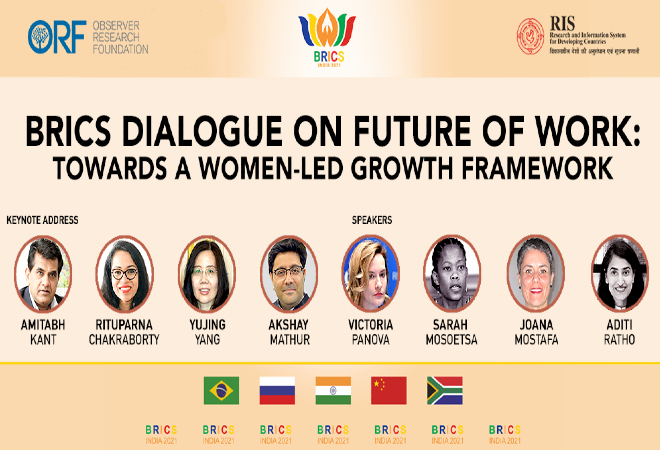BRICS Dialogue on the future of work: Towards a women-led growth framework
On June 2 the National Committee on BRICS Research took part in BRICS Dialogue on the future of work: Towards a women-led growth framework organized by ORF.

Participants:
- Prof Sarah Mosoetsa, Chief Executive Officer of the National Institute for the Humanities and Social Sciences, South Africa
- Dr Victoria Panova, Managing Director of the Russian National Committee on BRICS Research, Russian W20 Representative, Russia
- Ms Joana Mostafa, Senior Researcher, Institute for Applied Economic Research (IPEA), Brazil
- Ms Rituparna Chakraborty, Co-Founder and Executive VP, Teamlease, India
- Ms Yang Yujing, Associate Researcher, Women’s Studies Institute of China
Moderator – Ms Aditi Ratho, Associate Fellow, Observer Research Foundation
Keynote Speaker – Amitabh Kant, CEO, Niti Aayog
There is a general agreement that the pandemic has disproportionately affected women more. Mr Amitabh Kant, keynote speaker mentioned that the recent McKinsey & Co report very well indicates the vulnerable and deteriorating condition of working women in particular. The report highlights the harsh realities of women in the workforce; it estimates that female job loss rates (due to the pandemic) are 1.8 times higher than their male counterparts. The panel indicated several important issues which have contributed to these statistics like inappropriate facility of childcare, rural-urban divide, lack of infrastructure facility, and sex-disaggregated data, etc. Various measures were put forward by all the panellists that can be adopted by BRICS as a single entity. Subsidised work pressure, fair work wage, public services for child and elderly care, etc. are few proposed ways forward which can be adopted.
Professor Sarah Mosoetsa, CEO of the National Institute for the Humanities and Social Sciences, South Africa pointed out that an intervention is needed for the women in the economic reconstruction plan. She added by saying that South Africa is already prioritising a few sectors like tourism which are dominated by women as it would help them in gender mainstreaming. Prof Mosoetsa observed that women belonging to countries like India and South Africa have been affected the most because of the precarious state of the informal sector dominated by women and mentioned the need for a minimum and fair wage for women. According to her, the IT sector is one place where the participation of women is required the most and countries should work to train more women in this particular field.
Furthermore, Dr Victoria V. Panova, Managing Director of the Russian National Committee on BRICS Research, emphasised the need for a BRICS Collective Commitment to ‘Women Economic Empowerment’ as the BRICS nations have always ranked very low on the Gender Inequality Index. There is a need for a systemic BRICS position on women-led growth. All BRICS nations lag behind in women’s economic and political participation, although policy efforts are being made to mitigate this. It is important to have gender-responsive budgeting and trade policy and collection of sex-aggregated data for various parts of the economy. She highlighted the need to have more women entrepreneurs and the way to achieve this would be by giving them access to necessary infrastructure, IT infrastructure in particular.
Ms Joana Mostafa, Senior Researcher, Institute of Applied Economic Research, Brazil, highlighted the crisis situation created by the pandemic. The precariousness of work for both men and women along with increased family debt, and given that so-called “female activities” of domestic work and care work and other life supporting activities are either underpaid or unpaid and, therefore, are captured by capitalist value chains and the subjects that can better take part in them. She noted the need to push for well-being indicators outside of the national accounts, better unpaid, and voluntary work stats, better food security stats, better reproductive health, autonomy, and sexuality stats, better subjective well-being stats, better violence against women stats, and even better micro politics stats to see where women are in political life. There is a need for a new understanding of growth beyond GDP.
The pandemic has overburdened the women in workforce as their household and professional work has infused into one especially in countries like India, Ms Rituparana Chakaraborty, Co-Founder and Executive VP, Teamlease, India observed. She agreed with Professor Mosoetsa on female workers in the informal sector facing the socio-economic brunt of the pandemic and also facing a higher risk of contagion. An important trend in the Indian context, she pointed out, was that despite the increase in literacy levels of women in urban centres, there was no increase in the participation of women in formal work. In fact, women’s participation in formal work reduced over the last decade even as informal sector participation increased. She stressed on the need for more gender-sensitive policymaking, including labour laws, to overcome employer hesitancy in employing women.
Ms Yang Yujing, Associate Researcher, Women’s Studies Institute of China, emphasised the advancements made by the internet for women by bringing more opportunities and giving a push to the gig economy. She pointed out the need for better infrastructure in rural areas to narrow the digital gender divide and to work on public service for elderly and child care. Technology can play an important role in increasing women’s participation in the economy due to the flexibility and autonomy it brings. There is a need to invest in internet infrastructure and skilling women to help them participate in new technologies and take the lead in these spheres to create gender equal spaces.
A key learning then was the need to recognise various sorts of unpaid labour, whether in care work, or in formal sectors of the economy like the agriculture sector, Aditi Ratho, Associate Fellow, Observer Research Foundation noted. She also reiterated the need for encouraging women’s participation in sectors of the future, not just as part of the labour force, but also as leaders in their own right.
Origin: https://bit.ly/3cQaAWB


